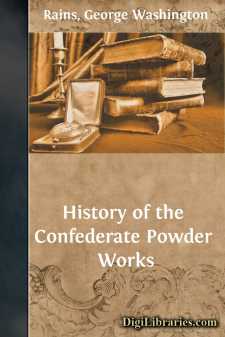Categories
- Antiques & Collectibles 13
- Architecture 36
- Art 48
- Bibles 22
- Biography & Autobiography 813
- Body, Mind & Spirit 142
- Business & Economics 28
- Children's Books 17
- Children's Fiction 14
- Computers 4
- Cooking 94
- Crafts & Hobbies 4
- Drama 346
- Education 46
- Family & Relationships 57
- Fiction 11829
- Games 19
- Gardening 17
- Health & Fitness 34
- History 1377
- House & Home 1
- Humor 147
- Juvenile Fiction 1873
- Juvenile Nonfiction 202
- Language Arts & Disciplines 88
- Law 16
- Literary Collections 686
- Literary Criticism 179
- Mathematics 13
- Medical 41
- Music 40
- Nature 179
- Non-Classifiable 1768
- Performing Arts 7
- Periodicals 1453
- Philosophy 64
- Photography 2
- Poetry 896
- Political Science 203
- Psychology 42
- Reference 154
- Religion 513
- Science 126
- Self-Help 84
- Social Science 81
- Sports & Recreation 34
- Study Aids 3
- Technology & Engineering 59
- Transportation 23
- Travel 463
- True Crime 29
History of the Confederate Powder Works
Categories:
Description:
Excerpt
In accepting your invitation to address you on the general history of the Confederate Powder Works, I do so with some hesitation, on account of my close personal connection with a subject which absorbed my thought, time and energies.
In the history of a war we find, generally, but little reference to the manufactories engaged in the preparation of material; they had been previously established, and were in active operation before its commencement, their products being immediately available for active operations. An instance can scarcely be found in modern warfare where previous preparations had not been made, and where the necessary manufacturing works did not already exist.
The late war was entered upon unexpectedly. Throughout the Southern country it was supposed that the North would not seriously oppose a secession of the States from the Federal compact, hence no previous provision had been made for such contingency, and no material of war gathered.
Manufactories existed on a very limited scale, and none for war purposes, hence their speedy erection was of extreme importance, and had to be accomplished under the most unfavorable conditions.
The entire supply of gunpowder in the Confederacy at the beginning of the conflict, was scarcely sufficient for one month of active operations, and not a pound was being made its limits. To enter upon a great war without a supply of this essential material, and without effective means of procuring it from abroad, or of manufacturing it at home, was appalling.
No one was so well aware of this condition of things as the President of the Confederate States, who, being an educated soldier, was fully alive to the requirements of war, and at once took active measures for the creation of war material. Among these, was the erection of a great gunpowder manufactory.
It is the custom of the different nations, in addition to the private factories of gunpowder, to have erected at different points national [p4] works to supply the demand for war. The very limited resources of the Confederacy not admitting of division, had to be accumulated at one point. Mr. Davis was necessarily acquainted with most of the officers of the old army, as he was graduated at West Point, served with great distinction in the war with Mexico, and had been Secretary of War under the Federal Government; he was thus enabled to select his agents for the different services required. Thus that very competent officer, General Gorgas, was placed at the head of the Department; I had the honor of being appointed to take charge of the manufactory of gunpowder, a carte blanche being given. The necessary works were to be erected as nearly central as practical; to be permanent structures, and of sufficient magnitude to supply the armies in the field and the artillery of the forts and defences.
On the 10th July, 1861, I left Richmond to enter upon this duty. Making a rapid tour through the South to find a suitable site, Augusta was selected, for several reasons: for its central position; for its canal transportation and water-power; for its railroad facilities; and for its security from attack—since the loss of the works would have been followed by disastrous consequences....


